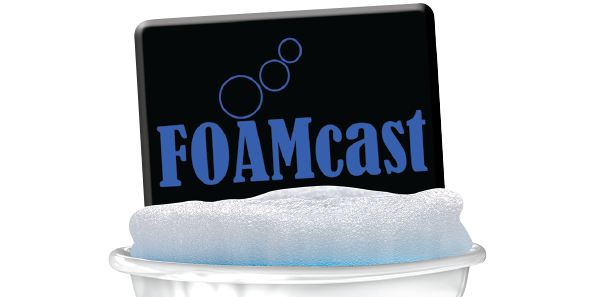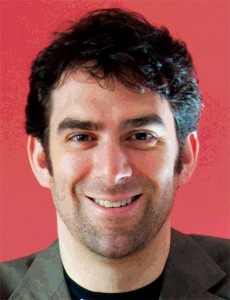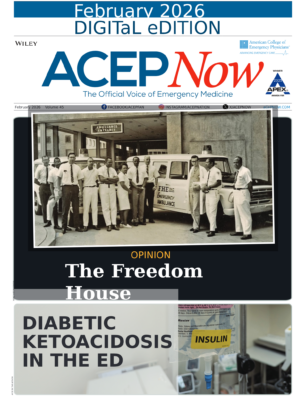
In the two years that we’ve been doing the FOAMcast podcast, some of the most interesting topics covered have come from fields outside of emergency medicine. This year, we’ve recorded two episodes on new guidelines published by experts from non-EM specialties that have an impact on emergency medicine practices. We believe that keeping up with the latest guidelines from our colleagues in other specialties and covering them in the podcast helps us become more well-rounded emergency physicians.
Explore This Issue
ACEP Now: Vol 35 – No 07 – July 2016Diverticulitis Management
In March, we covered a recently released guideline on the management of diverticulitis published by the American Gastroenterological Association (AGA). The topic was inspired by a post on the Emergency Medicine Literature of Note blog (EMlitofnote.com) by Ryan Patrick Radecki, MD, MS. Dr. Radecki’s ACEP Now article “Antibiotics, Hospital Admission May Not Help Uncomplicated Diverticulitis” also addressed the topic.
We were surprised to learn that the AGA isn’t routinely recommending antibiotics in the management of CT-confirmed uncomplicated diverticulitis. According to its new guideline, antibiotics neither hasten recovery nor prevent complications and may be used selectively—although it’s worth noting that this recommendation was based on fairly low-quality evidence.
Additionally, we found some of the AGA guidelines and other statements to be simply too funky and irresistible not to repeat here:
- Mainly, we enjoyed the fact that the guideline answered everyone’s essential and crucial question about whether eating popcorn, nuts, or seeds should be avoided in patients with acute diverticulitis. (There’s no need to recommend avoiding these foods.)
- Do probiotics help decrease recurrence, pain, or the need for surgery? (No, no, and no.)
- Should physicians encourage patients with acute diverticulitis to engage in vigorous exercise in an attempt to decrease recurrent disease? (Yes!)
- Finally, we were interested to learn that recommending elective colonic resection for patients suffering from an initial episode of acute uncomplicated diverticulitis isn’t necessary. (Confession: we were less interested in this last recommendation and more than just a little bit surprised that this notion actually needed official clarification.)
Brief Resolved Unexplained Events
Last month, another clinical guideline caught our eyes, this time coming from the American Academy of Pediatrics (AAP). The news is that the term “apparent life-threatening event” (ALTE) in neonates and infants has now been replaced by the somewhat less intimidating term “brief resolved unexplained event” (BRUE). This change comes 30 years after the term ALTE was proposed as a replacement for “near-miss sudden infant death syndrome,” as well as the subsequent appearance of a substantial body of literature demonstrating that SIDS and ALTEs were indeed distinct and unrelated clinical entities.
The new AAP guideline states that a BRUE can be diagnosed in an infant younger than 1 year whose symptoms have already resolved by the time of presentation. To qualify as a BRUE, one or more of the following features must have been present: cyanosis or pallor; absent, decreased, or irregular breathing; marked change in body tone, either hypotonia or hypertonia; and an altered level of responsiveness. A BRUE can be diagnosed if a thorough history and physical exam has been conducted and no explanation for the event has been discovered.
From there, risk stratification determines how to proceed with management. While the guideline makes no specific recommendations for higher-risk infants, for lower-risk infants (defined as a first-time event occurring in an infant older than 60 days, born full-term or more than 45 weeks corrected gestational age), no CPR by a trained medical professional was required, and given the event lasted less than one minute, remarkably few obligate interventions are needed.
The only measures that should routinely be taken are that parents should be educated about BRUE, there should be shared decision making regarding discharge versus admission with parents, and resources for learning CPR should be offered to parents and other caregivers.
In fact, citing the goal of decreasing the harms of common false-positive findings, the AAP recommends that lower-risk BRUE babies need no routine laboratory testing. The only measures that should routinely be taken are that parents should be educated about BRUE, there should be shared decision making regarding discharge versus admission with parents, and resources for learning CPR should be offered to parents and other caregivers. ECG, pertussis testing, and pulse oximetry may be performed but aren’t considered necessary. Automatic admission to the hospital for observation and testing need not be done due to the goal of decreasing health care-associated infections and other safety risks.
In summary, the overall theme of this excellent guideline seems to be a de-escalation in terminology in an attempt to move away from unnecessary testing and often fruitless admissions. (We think we can hear the sounds of EM physicians and pediatricians everywhere vigorously applauding in agreement and thanks.) Some parents won’t be all that reassured by the word “unexplained” in their child’s diagnosis, but we’re guessing it will be outshined by the abandoning of “life-threatening,” a phrase that’s neither calming nor accurate.
Medications That Cause False Positives
Finally, as promised, the podcast spent the better part of a recent episode going over the biggest culprit medications that cause false-positive results on urine toxicology screens. The topic was inspired by a post on the blog MDAware by Seth Trueger, MD, MPH.
The biggest pseudo-surprise (we were not remotely surprised to learn) was that the “honor” for the class of drug most likely to cause a false positive on a urine drug toxicology test goes to tricyclic antidepressants (TCAs). TCAs can cause false-positive readings for five different drugs: PCP, LSD, amphetamines, opiates, and methadone. The runners-up for medications causing the most false positives on the urine toxicology test were ibuprofen and first-generation antihistamine medications such as diphenhydramine, hydroxyzine, and promethazine.
Tune in for the next episodes, which will look at unusual seizures (ie, the ones that don’t respond to benzodiazepines).
 Dr. Faust is a senior emergency-medicine resident at Mount Sinai Hospital in New York. He tweets about #FOAMed and classical music @jeremyfaust.
Dr. Faust is a senior emergency-medicine resident at Mount Sinai Hospital in New York. He tweets about #FOAMed and classical music @jeremyfaust.
 Dr. Westafer is chief resident at the Baystate Medical Center at Tufts University in Springfield, Massachusetts. Follow her @LWestafer.
Dr. Westafer is chief resident at the Baystate Medical Center at Tufts University in Springfield, Massachusetts. Follow her @LWestafer.
Pages: 1 2 3 | Multi-Page




No Responses to “Medical Guidelines from Non-Emergency Medicine Experts Benefit Emergency Physicians”